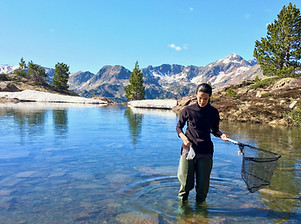
Wildlife Health and Conservation
Wildlife health is crucial for conservation and biodiversity preservation, as the stability and resilience of ecosystems rely on healthy wildlife populations. Monitoring wildlife health helps prevent disease outbreaks, which can decimate populations and disrupt ecological interactions. Ensuring the well-being of wildlife also mitigates the risk of zoonotic diseases spreading to humans. Conservation efforts that prioritize wildlife health create more sustainable environments in which both wildlife and people can coexist and thrive.







As veterinarians and researchers, we actively contribute to wildlife conservation by generating knowledge on the determinants of health, estimating their impact, and promoting health by informing management decisions. At WildCoM, we have been studying the emergence and causes of disease in wildlife in a variety of pathogens, hosts, and systems. Among others, we have been working on border disease in Pyrenean chamois, trichomoniasis in European turtle doves, Suttonella ornithocola in garden passerines, and avian malaria in house sparrows.
Our work also includes assessing the health of wildlife species in a broader scope, in pipistrelle bats, cinereous vultures, northern wheatears, and a variety of other species. We use both traditional tools like molecular, bacteriological, and toxicological methods, as well as cutting-edge technologies like metagenomics and microbiome analysis.
We also developed the Amphibian Surveillance Programme of Catalonia (ASPrCAT) and studied the infection dynamics of chytridiomycosis in alpine ecosystems to assess the contribution of different host species to chytridiomycosis dynamics and the impact of this disease on amphibian populations.
We invite you to explore our numerous projects by having a look at our “news” feed.